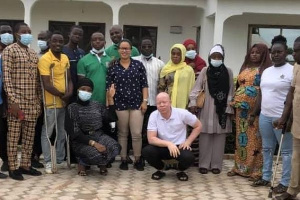 Participants at a two-day workshop on advocacy and influencing skills for PwDs
Participants at a two-day workshop on advocacy and influencing skills for PwDs
Some members of the Federation of Disability Organisations have called on the government to prioritise the study of sign language at schools to ensure an all-inclusive development in the country.
They said persons with disabilities (PwDs) were confronted with the challenge of accessing some basic facilities like health centres, schools, sign language interpreters and teaching and learning materials.
They called on government and other key stakeholders to examine the challenges confronting PWDs and to develop strategic mechanisms to ensure their participation in the various sectors of the country.
Mr Mohammed Iddrisu, Northern Regional President, Ghana Federation of Disability Organisations, said the non-availability of sign language interpreters in key government institutions was a threat to the health needs of PWDs and breach of their basic rights.
He lamented that most PwDs were often denied quality health care because of lack of sign language interpreters at the health facilities.
He said “There are instances where our members are turned down from accessing health care, or wrong prescriptions are given to them because of language barrier.”
Mr Mohammed Iddrisu said this during a two-day workshop on advocacy and influencing skills organised by Centre for Research and Development Alternatives (CREDA) with funding support from OXFAM in Ghana, Norsaac amongst other partners.
The workshop brought together individuals and youth groups with disabilities in the Northern Region to sensitise them on the need to collaborate in tackling issues affecting young people.
It was also to assess some of the challenges young people went through and how to deploy measures in safeguarding them.
Madam Issah Rahama, Project Manager at CREDA, said it was necessary for the promotion of the representation of people with disability within youth networks in the country, adding, it would serve as a platform to demonstrate their talents and capabilities geared towards development.
She said the main idea behind the workshop was to ensure the reintegration of various youth groups with disability and those without disability in order to encourage unity and patriotism towards national development.
Mr Mahmud Mohammed, Quality Programme and Influencing Lead at OXFAM in Ghana, said the workshop was organised to respond to the study conducted by OXFAM in Ghana, which indicated that young people, who were disabled, were often excluded from decision-making.
He said “The best way to avoid this discrimination against PwDs was to strengthen their capacity by providing knowledge and connecting them to the various youth networks across the country through advocacy and sensitisation”.
Participants called on government and other stakeholders to ensure fair representation of PwDs at the local level, training of more sign language interpreters, provision of text books and other learning materials to enhance quality education among them.